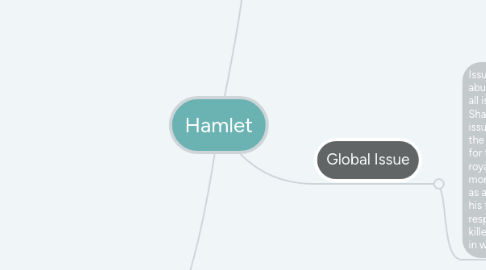
1. Key Concept
1.1. Transformation
1.1.1. Transformation is a crucial notion in the play, as the characters' feelings and intentions change throughout the scenes. For example, the development in Hamlet's obsession towards death from Act 1 Scene 2 and Act 3 Scene 1. His mental state has deteriorated from his first soliloquy where the thought of suicide was in Hamlet’s mind, however, he knows he cannot commit this sinful act. Whereas in the 3.1 soliloquy, Hamlet’s mental state has worsened and he loses faith in “The slings and arrows” (III.I.3) of his fortune.
1.1.1.1. This example suggests a negative change of events that had impacted Hamlet's emotions of sorrow and despair, therefore transforming his way of thinking. Transformation is the most relevant key concept as each character experiences some kind of dramatic change. For Hamlet it is the growing instability of his mental state.
2. Literary Terms
2.1. Imagery
2.1.1. "Within a month, Ere yet the salt of most unrighteous tears Had left the flushing in her gallèd eyes" (I.II.155-156)
2.2. Symbolism
2.2.1. "Tis an unweeded garden That grows to seed. Things rank and gross in nature Possess it merely. That it should come to this" (I.II.135-137)
2.3. Alliteration
2.3.1. "Whiles, like a puffed and reckless libertine, Himself the primrose path of dalliance treads" (I.III.49-50)
2.4. Foil
2.4.1. Is a minor character whose attitudes, beliefs, and behavior differ significantly from those of the main character and highlights the flaws of the protagonist. In the play, Horatio acts as a foil to Hamlet
2.5. Comic Relief
2.5.1. The graveyard scene in act five, which is a humorous episode in a play.
2.6. Metaphor
2.6.1. "Besides, to be demanded of a sponge!" (IV.II.12)
3. Global Issue
3.1. Issues such as dysfunctional families, the abuse of power and the desire of revenge are all issues that relate to both today and Shakespeare's audience. The spirit of these issues is the conflict between what is right for the individual and what is in the best interest for the common good of society; and as royalty, all the characters must act on what is more beneficial to their society. For example, as an honor to his father; Hamlet must avenge his father's death and kill Claudius, who is responsible for his father's death. Claudius killed King Hamlet in order to take his power, in which he was successful in doing so.
3.1.1. Dysfunctional Families
3.1.1.1. When Hamlet is first introduced, he is grieving the recent death of his father. We feel for Hamlet when his mother rebukes him for his sadness: ‘cast thy nighted colour off’. Claudius further adds on to Gertrude’s insensitivity by telling him ‘But to persever/In obstinate condolement is a course/Of impious stubbornness; tis unmanly grief’. Hamlet struggles with the his new family as Claudius, his uncle has married his mother with what appears to Hamlet as ‘indecent haste’. Hamlet makes it clear to Claudius that his loyalty belong to his father and not to him through his acerbic pun: ‘I am too much i’ the sun'. Hamlet is torn between loyalty to his father’s memory and obedience to his mother: ‘I shall in all my best obey you Madam’.
3.1.2. Abuse of Political Power
3.1.2.1. Another issue is the abuse of political power. Claudius has murdered his brother and taken the Danish throne unlawfully. As a result, he has no legal or moral legitimacy to the throne. Claudius is the antagonist who uses his power as king to get what he wants. He encourages Polonius to spy on Hamlet and Ophelia for him, and he uses Hamlet’s friends, Rosencrantz and Guildenstern for his own sinister plans. Claudius abuses his power.
3.1.3. Desire for revenge
3.1.3.1. The play ‘Hamlet’ after all, is a revenge play. The pursuit for revenge is as relevant today as it was in Shakespeare’s day. In the play, three sons are seeking revenge for the deaths of their fathers. Hamlet is charged with the task of avenging his father’s ‘foul and most unnatural murder’. Hamlet knows that it is his duty to seek this vengeance. However, Hamlet recoils from the task because of his conscience. Characters like Fortinbras and Laertes are ruthless to prove their honor and loyalty: ‘Rightly to be great/Is not to stir without great argument/But greatly to find quarrel in a straw/When honour’s at the stake’.Laertes tells Claudius: ‘To hell, allegiance! vows, to the blackest devil/Conscience and grace, to the profoundest pit’. Fortinbras is willing to jeopardise the lives of twenty thousand men for ‘a little patch of ground/That hath no profit but the name’. He was willing to regain a pointless piece of land in order to achieve justice against the Danes. Hamlet is not by nature a chastiser and he struggles mentally, with having to take the law into his own hands. It is only in the fencing battle after Laertes exposed Claudius’s attempt on his life, that Hamlet loses it and kills Claudius.
